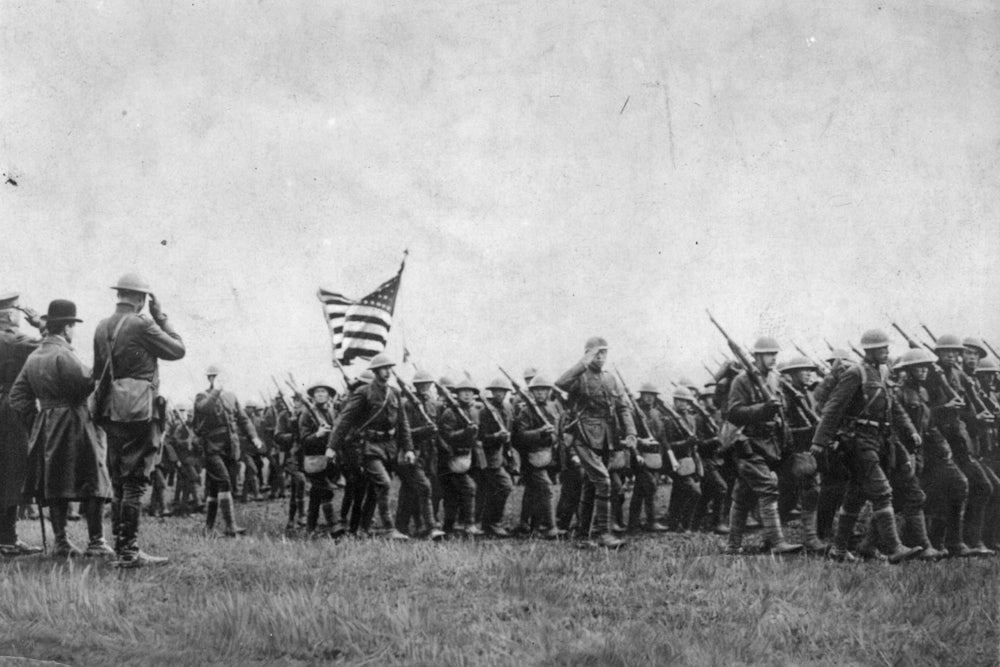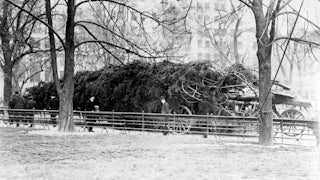The current agitation for preparedness has set hosts of Americans to thinking out for the first time what a real national strength and readiness would mean. We suddenly realize that if we are to defeat that militaristic trend which we loathe we shall have to offer some kind of action more stirring and more creative. The call now upon every citizen is to be not nebulously patriotic, but clear and lucid as to America’s aims, so that our national energy shall not be squandered and misused. There looms up as a crucial need that “moral equivalent for war” with which William James first roused our imaginations. It seems no longer so academic a proposal. Confronted with the crisis, we see that he analyzed the situation with consummate accuracy.
All around us we feel a very genuine craving for unity of sentiment, for service, for some new national lift and broadening which shall keep us out of the uneasy pettiness into which the American conscience has threatened to fall. In our hearts we know that to crystallize this desire into a meaningless sentiment, or into a piling-up of armaments or a proscribing of alien cultures, would not satisfy us. We want action, but we do not want military action. Even the wildest patriots know that America would have to go through the most pernicious and revolutionary changes to accept the universal military service which they advocate.
We wish to advance from where we stand. We begin to suspect that military service, flag-reverence, patriotic swagger, are too much the weary old deep-dug channels into which national feeling always runs and is lost. The flooding river fills again its archaic and forsaken paths. Our present confusion expresses the dilemma we find ourselves in, when our instincts impel us into courses that our intelligence tells us we ought not to follow.
Our American danger is not so much that we become militarists as that we grope along, fretting and harrying each other into a unity which is delusive, and expressing our “Americanism” in activities that are not creative. The best will in America at the present time seems to crave some kind of national service but it veers off from military service. Until we satisfy that craving, we shall run at half-power, and suffer all the dissatisfaction and self-despising that comes from repressed energy. The question which all are asking, in the varied and disguised forms, is: How can we all together serve America by really enhancing her life?
To more and more of us the clue has come through James’s conception of a productive army of youth, warring against nature and not against men, finding in drudgery and toil and danger the values that war and preparation for war had given. Ten years ago such an army seemed Utopian. We had neither the desire nor the technique. It seemed a project not to be realized without a reorganization of our life so radical as to make the army itself unnecessary.
Today, however, a host of new attitudes seem to give us the raw material out of which such a national service could be created. We hear much of universal military service as “education.” The Plattsburgs are sugar-coated as “civic training camps,” “schools for citizenship.” Universal service no longer stands on its old ground of mere preparation for war. It is frankly trying to get itself recognized as an indispensable mode of education. The next pertinent step is evidently to ask why, if universal service is valuable because it is educational, it should not be constructed on a strict educational foundation.
James’s proposal sounded Utopian because it would require an entirely new and colossal national organization to put into action. Universal military service in this country would certainly mean such a task. But if our national service is to be educational, we already have the organization in existence. The rapidly consolidating public school systems in the states provide the machinery for such an organization. As the public schools become better places for children to spend their time in, we are growing less tolerant of the forms of schooling outside of the public system. The tendency is towards the inclusion of all children in the public school. And the progressive states are requiring schooling up to the full age of sixteen years. We are rapidly creating a public school system, effectively administered by the states, which gives us the one universally national, compulsory service which we possess or are ever likely to consent to.
Education is the only form of “conscription “ to which Americans have ever given consent. Compulsory military service would require decades of Napoleonic political evangelism to introduce. Compulsory education is universally accepted. For a national service which shall be educational you would have to convert nobody. The field is sown. No one denies the right of the state to conscript the child for education. But coupled with this assent is the insistence that the education shall be the freest, fullest and most stimulating that we know how to give. The current educational interest arises largely from the indignant demand that a state which takes all the children must meet the needs of every child. The very recent enthusiasm for “vocational education” means that we want a schooling that shall issue in capacity for fruitful occupation. A national educational service could give training for work at the same time that it gave opportunity for service.
It is only a national service of this kind that would really be universal. Military service is a sham universality. It omits the feminine half of the nation’s youth. And of the masculine half it uses only the physically best. France is the only country where the actual levy on men for military service has approximated the number liable. But worst of all, military service irons out all differences of talent and ability. It does not even tap the resources it enlists. It makes out of an infinitely varied group a mere machine of uniform, obeying units. The personal qualities, the individual powers of the youth it trains, are of no relevance whatever. Men are valuable exactly to the degree that they crush out these differences.
A national service for education would not be a sham. It would actually enlist the cooperation of every youth and girl. It would aim at stimulation, not obedience. It would call out capacity and not submerge it. It would organize varied tasks adapted to the capacities and strengths of its young citizenry. It would be universal, but it would be compulsory only in the sense that it called every one to the service. The tasks would not be enforced drudgery, but work that enlisted the will and toned up the aspirations.
Such a national service would he the logical outgrowth of our public school system. Suppose the state said: All children shall remain in school till the age of sixteen years. Between the ages of sixteen and twenty-one they shall spend two years in national service. This service shall be organized and administered by the state educational administrations, but supervised and subsidized by the national government. The service would be performed as national service, but its work would be constructive and communal in its purposes and not military. Special military training could be given as a branch of this service to those who were best fitted for it. But defense would be but an incident in our constructive life, and not the sinew of our effort.
The tasks for such a national service would evidently be different from those contemplated by James. He thought of turning his army of youth into the drudgery of the world, where they might win in heroic toil and self-sacrifice the moral rewards which war had formerly given. But if our service is to be universal, it cannot be mere unskilled labor in mines and farms and forests. A large proportion of our youth would be disqualified. Furthermore, a service which made such frontal attack on industry would be bitterly resisted by those with whom its work competed.
We are not prepared for a service which clashes too suddenly and harshly with the industrial system. What we need is a service which shall not so much do the old work of the world as create new demands and satisfy them. This national service could do the things which need to be done, but which are not now being done. It could have for its aim the improvement of the quality of our living. Our appalling slovenliness, the ignorance of great masses in city and country as to the elementary technique of daily life—this should be the enemy of the army of youth. I have a picture of a host of eager young missionaries swarming over the land, spreading the health knowledge, the knowledge of domestic science, of gardening, of tastefulness, that they have learned in school.
Such a service would provide apprentices for communal services in town and country, as many schools and colleges are already actually providing. Food inspection, factory inspection, organized relief, the care of dependents, playground service, nursing in hospitals—all this would be a field for such an educational service. On a larger scale, tree-planting, the care and repair of roads, work on conservation projects, the care of model farms, would be tasks for this army.
As I was burning caterpillars’ nests the other day in New Jersey and saw the trees sinister with grey webs, I thought of the destroying army of youth that should be invading the land clearing it of all insect pests. We might even come to the forcible rebuilding of the slovenly fences and outhouses which strew our landscape, and to an imposition of cleanness upon our American countryside. With an army of youth we could perform all those services of neatness and mercy and intelligence which our communities now know how to perform and mean to perform, hut have not the weapons to wield.
The army could be organized in flying squadrons, so that its youth could travel widely and see and serve all kinds of men and communities. For its direction we would need that new type of teacher–engineer–community worker that our best school systems are already producing. Scientific schools, schools of philanthropy, are turning out men and women who could step into their places as non-commissioned officers for such an army. The service could be entirely flexible. Boys and girls could learn the rudiments of their trade or profession in actual service with the army. Book studies could be carried on, and college learning could come to its own as the intellectual fertilizer of a wholesome and stimulating life. Athletics and sports would be an integral part of the two years’ service. There would be long periods of camping in the national parks or upon ocean beaches. The Boy Scouts and Camp-Fire Girls already give the clue to such an enterprise.
If objection is made that this national educational service would fail to bring out the sterner qualities of heroism and self-sacrifice, and would not be a genuine moral equivalent for war, the answer is that the best kind of a moral equivalent is a moral sublimation. We want to turn the energies of youth away from their squandering in mere defense or mere drudgery. Our need is to learn how to live rather than die; to be teachers and creators, not engines of destruction; to be inventors and pioneers, not mere defenders. Our cities and isolated farms alike are mute witnesses that Americans have never learned how to live. Suppose we had a national service which was making a determined assault for the enhancement of living. Would its standards and discipline be less rigorous? Rather would the ingenuity and imagination have to be of the finest.
Some such conception of national service is the only one which will give us that thrill of unity and vigor which we seek. An educational service built on the public school system puts the opportunity in our hands. The raw material in attitudes and desires is here. Every task that an army of youth might perform is already being done in some school or college or communal service. All we need to do is to coordinate and make universal what is now haphazard and isolated. An army of youth which focused school work would provide just that purpose that educators seek. The advocates of “preparedness” are willing to spend billions on a universal military service which is neither universal nor educational nor productive. Cannot we begin to organize a true national service which will let all serve creatively towards the toning up of American life?






